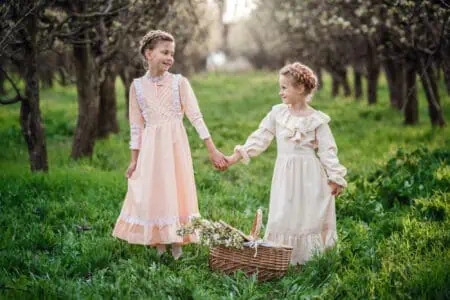Medieval last names placed significant importance on occupation, place, paternity, and even physical attributes. We’ve all heard titles like Farmer, Smith, and Baker, which are all occupational surnames from days of old.
Likewise, Hill, Lancaster, Brentford, and Easton fall into a category known as habitational or topographical names.
So, you’ve come to the right place for the traditionalist out there looking for a slice of history in their medieval surnames.
161 Historical Medieval Family Names
Whether it’s the color of your hair, where you live, gender, or occupation, medieval surnames reflect status, skill, and location.
- Ace – this catchy modern-sounding name meaning “one, unity” has roots in medieval France.
- Acey – is an Anglo-Saxon surname meaning “unity.”
- Adlington – this ancient English habitational name means “settlement of the Eadwulf people.”
- Adrienne – a French version of Adrian meaning “from Hadria.”
- Agincourt – named after the famous French battle that ended the 100-year war.
- Aimar – a Germanic surname commonly used in the Basque region of Spain.
- Allaire – another Old French name meaning “cheerful.”
- Allsop – stemming from Anglo-Saxon tribes, meaning “God of war and peace.”
- Appel – possibly Dutch, German, or English, meaning “apple.”
- Baker – a Middle English occupational name meaning “to dry by heat.”
- Bamford – this ancient English habitational name refers to a “to a tree-beam over a ford.”
- Barnard – possibly from the French and German Bernard, meaning “strong, brave bear.”
- Barnewall – another geographical place name meaning “of Barnwell” in Old English.
- Beaulieu – similar to Beaumont, meaning “lovely place” in French.
- Beaumont – a French place name, “Beau” (fair/lovely), and “mont” (hill) means “lovely hill.”
- Beckett – is an Old English place name meaning “bee cottage or bee hive.”
- Berryann – from Old French and English, meaning “one who dwelt at the castle.”
- Blakewood – taken from someone who lived near a “black wood” or “dense forest.”
- Blanning – this headstrong name means “admirer, enthusiastic, and independent.
- Bliss – an Old English descriptive name that means “joy and happiness.”
- Binns – a topographical English name for someone living in a “hollow,” or it means “bowl.”
- Bisby – a habitational English name meaning “farm” in Old Norse.
- Bowe – this rare Old English and Irish name means “victorious.”
- Brentford – a place name in England meaning “ford over the River Brent.”
- Brewer – this Old English occupational name refers to the “ale of a beer maker.”
- Browne – from the Old English and French word “brun,” relating to someone with dark hair.
- Burdick – derived from the Middle English “burdock,” a prickly weed with dock-like leaves.
- Carey – with several meanings, it could be “love,” “hill fort,” or “black.”
- Carter – an occupational English, Irish, and Scottish name meaning “driver of a cart.”
- Ead – from an Old English last name meaning “abundant riches.”
- Easton – in medieval times, Easton was a name for someone from the “east settlement.”
- Edison – meaning “son of Edward” in Old English, Edison would make an excellent fantasy name.
- Elias – derived from the Hebrew name Elijah, meaning “the Lord is my God.”
- Elwood – probably a habitational name meaning “elder tree forest” in Old English.
- Emory – this Old German name means either “brave power” or “work and ruler/leader.”
- English – this obvious name describes the native language and population of England.
- Erickson – an Old Norse name more popular in Scandi countries, meaning “son of Erik.”
- Farmer – as middle ages last names go, this one describes farmers or people working the land.
- Fischer – this German occupational name means “fisherman.”
- Fish – another occupational name derived from Anglo-Saxon for ”someone working with fish.”
- Foster – this Old English surname meaning “forest guardian” has Pagan roots.
- Fuller – a mixture of Old French and English for “someone working with cloth.”
- Geoffrey – meaning “divine peace,” as medieval surnames go, this one has a noble feel.
- Gerard – is spawned from ancient Anglo-Saxon, meaning “spear brave.”
- Godfrey – derived from Old French, this Germanic name means “God-peace.”
- Graves – this medieval locational name derives from someone who lives “at the grove.”
- Greaves – derived from Old English, meaning “brushwood thicket.”
- Griffin – an old-fashioned Latin name meaning “strong lord or prince.”
- Griswold – this Old European surname means “gray ruler” in French and German.
- Grove – from the Old English word “graf,” meaning “grove of trees.”
- Grover – this Old English name describes someone who “lives near a grove of trees.”
- Gwydion – a famous Welsh master mage, meaning “born of trees.”
- Hackett – a name with multiple possible meanings, including “hooked nose, hunched body,” and “hewer.”
- Harcourt – this historical surname means “court farmyard” in Old French.
- Hawkins – with two possible meanings, this Irish/English name means “son of Hawkins” and “horseman.”
- Hawthorne – a habitational English name signifying someone who lives where “hawthorn trees grow.”
- Haynes – this Old English name means “enclosure” and “hawthorn or hedge.”
- Hayward – a Middle English occupational name for the “keeper of hedges and enclosures.”
- Hazel – this Old English name refers to the hazel tree or its color.
- Head – for someone with a large head or someone living at the “head” of a hill.
- Helm – an Old English name meaning “protective covering” for someone working in a “cattle barn.”
- Hendrey – a Scottish name derived from Henry, meaning “ruler of the home.”
- Hill – a classic English name for someone “living on or near a hill.”
- Holley – this Old English name means “holly tree” or “clearing by the hollow.”
- Holloway – an Old English word meaning “holy spring” and “someone living in a sunken road.”
- Holt – from Anglo-Saxon, this medieval English name means “wood” and “living near a grove of woods.”
- Homer – this cool Greek name means “hostage, pledge.”
- Hood – a Scottish occupational name for someone who “makes hoods.”
- Hooke – a topographical English name describing “a hill or elevated place.”
- Hope – derived from the Old English word “hopian,” meaning “positive expectation.”
- Howe – meaning “hill, knoll, or mound,” Howe derives from the Old Norse word “haugr.”
- Hughes – this Gaelic and French name means “fire” and “son of Hugh.”
- Hume – a Scottish habitational name derived from “home,” meaning “calm.”
- Jester – derived from the French “geste,” the occupational name for medieval funny guys.
- Kaye – with roots in Latin and Greek, this Irish name means “pure and happy.”
- Keats – an occupational English name for someone who worked as a cattleman or herder.”
- Kemp – derived from the Middle English word “cempa,” meaning “warrior and champion.”
- Kerr – a Scottish name possibly meaning “dark” or “marsh dweller.”
- Kirk – this Scottish and Scandi name means “church” or “someone living near a church.”
- Knapp – a German and Old English name meaning “young unmarried man” or “hilltop/summit.”
- Knott – a habitational English name for someone “living on the summit of a rocky hill.”
- Knowles – meaning “little tree,” and a popular surname across the globe.
- Laidler – one of the rare medieval last names meaning “maker or user of ladles.”
- Lamb – this English name refers to “some working with lambs” or a “gentle-hearted person.”
- Lambert – of French, German, and English origin, meaning “bright land.”
- Lancaster – a place name in England, meaning “fort on the Lune River.”
- Lancelot – meaning “servant,” and the famous Knight of the Round Table.
- Langdon – another habitational name meaning “long hill slope.”
- Lawless – meaning “outlaw,” some medieval surnames indicate criminal descendants.
- Lee – in Old English, Lee means “a clearing or meadow.”
- Leigh – derived from Hebrew and Old English, meaning “weary, delicate,” or “meadow pasture.”
- Mabey – a mixture of French, Latin, and Middle English, meaning “lovable.”
- Mallory – this cool Old French surname means “unlucky or ill-fortuned.”
- Marsh – an English habitational name for someone who lives “near a fen or marsh.”
- Marshall – possibly an occupational name for a blacksmith meaning “horse servant.”
- May – the perfect surname for someone born in May.
- Medley – medieval family names don’t come any cooler, meaning “woodland clearing of a man called Mada.”
- Mercer – a classic French occupational name meaning “merchandise.”
- Meredith – this royal-sounding Welsh surname means “great lord.”
- Middleton – a habitational English name for someone living in a “middle town.”
- Miller – derived from the Old English word “milne,” meaning “to grind.”
- Montgomery – derived from Old French, meaning “gomeric’s hill,” an old-fashioned aesthetic.
- Morrison – a classic Irish surname meaning “sea valor.”
- Mortimer – derived from the French “morte mer,” meaning “dead sea.”
- Mowbray – this regal name has connections to William the Conqueror and means “from Montbray.”
- Napier – meaning “table cloth” in French, Napier refers to a servant responsible for linen.
- Nesmith – an occupational name for someone responsible for “making knives of nails.”
- Neville – a habitational French name for someone from the “new town.”
- Newby – possibly an English place name, Newby could also mean “new farm.”
- Newcomb – derived from Old English, meaning “newly come.”
- Norton – a habitational English name meaning “north settlement.”
- Oakey – possibly derived from “oak,” this name refers to people living near physical features.
- Paige – derived from the Latin “pagius,” meaning “young helper,” a name for a servant.
- Paine – a classic French peasant name describing “a villager or rustic.”
- Park – describing a “park enclosure,” this French word is linked with kings and nobility.
- Pike – this Old English surname means “dweller at a pointed hill” or “someone using a pickaxe.”
- Pitt – meaning “a pit or hollow,” and possibly a habitational or occupational name.
- Prescott – this cool male and female surname means “priest’s cottage” in Old English.
- Purvis – an Anglo-French surname meaning “dweller at a Parvis or Porch.”
- Quinnell – possibly meaning “women” and “battle/war,” this Anglo-Saxon name has style.
- Raleigh – is derived from the Old English “ra leah,” meaning “deer meadow.”
- Reynold – meaning “son of Reynold,” this Germanic name also means “powerful ruler.”
- Ridge – referring to someone living “at the ridge,” this English habitational name is cool.
- Roger – possibly meaning “son of Roger,” this Germanic word also means “fame/spear.”
- Rolfe – is an Old Scandinavian name meaning “renown” and “wolf.”
- Roth – perfect for redheads, this English and German surname means “red.”
- Rountree – possibly a habitational name referring to people living near “rowan trees.”
- Rowan – of Irish and Scottish origin, meaning “descendent of the red one.”
- Ryder – of English, Irish, and Dutch origin, meaning “messenger or mounted warrior.”
- Scroggs – a Scottish and English topographical name meaning “bushes and brushwood.”
- Seller – another English and Scottish occupational name referring to “a saddler.”
- Shepherd – one of the more obvious middle ages last names, meaning “sheep herder.”
- Shore – an English place name given to someone living near “the coast, a cliff, or the shore.”
- Slater – from Medieval French and English, meaning “slate worker.”
- Smith – meaning “to smite or strike,” this occupational name is as common as they come.
- Sommers – an Anglo-Saxon name given to the “son of Summers.”
- Steele – this badass Danish name means “son of Steele” and is associated with strength.
- Stoddard – derived from the Old English Stod, meaning “stud, or breeder of horses.”
- Swift – this Old English name describes someone with certain physical attributes like “speed.”
- Sykes – in Old English, Sykes means “stream,” making it a geographical name for “at the syke.”
- Taylor – derived from Old French and Latin, this occupational name means “to cut.”
- Thorn – possibly an Old English surname for someone living near a “thorn bush.”
- Tilly – this soft-sounding surname means “mighty in battle” in Old German.
- Tull – possibly derived from Tollet, a French nobleman who arrived during the Norman conquests.
- Turner – taken from the Old French word “tourneour,” meaning “to turn on a lathe.”
- Tyler – an Old English occupational name for someone who “tiles roofs.”
- Underwood – derived from Old English, meaning “dwelling at the foot of a wood.”
- Vaughan – taken from Welsh and Irish, meaning “small.”
- Vernon – derived from the Gaelic word “vern,” meaning “alder tree,” Vernon means “place of alder trees.”
- Webber – an English occupational name meaning “weaver” or “a maker of cloth.”
- West – a geographical name for someone or a settlement “to the west.”
- Whitney – is of Old English origin, meaning “white island.”
- Wilde – as medieval family names go, this does what it says in the title.
- Wilkins – a Germanic name meaning “helmet or protection” and “son of Wilkin.”
- Williamson – another Germanic name similar to Wilkin, meaning “son of William.”
- Willoughby – of Old Norse, German, and English origin, meaning “willow farm.”
- Witherspoon – this Scottish surname means “narrow strip of land.”
- Wood – an Old English surname describing someone living in or near a wood.
- Wright – derived from an old English word, “wryhta,” meaning “worker or shaper of wood.”
- Yorke – the ancient medieval city in England, meaning “boar or yew settlement.”
- Zimmerman – a medieval German word describing a “carpenter.”






